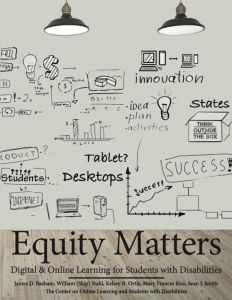
EQUITY MATTERS 2015 EXECUTIVE SUMMARY
Since its beginning in 2011 the Center has established research priorities fundamental to the interwoven and contextualized nature of the emerging online environment. Specific areas of investigation include:
- students with disabilities and their families,
- the personnel and institutions through which these students are being served, and
- the digital materials and delivery systems that support learner interactions within the full-time virtual, blended, and supplemental instances of online learning.
This publication presents some preliminary understandings from a number of Center research projects and experiences to inform the various stakeholder groups of the emerging trends, outcomes, challenges, and promising practices in this developing field of practice. Special education was founded on, and continues to operate as, a collaboration among students with disabilities, families, professionals, and policymakers. In addition, the digital education industry’s growing, major influence in this realm of education makes collaboration with this sector critical. The overall goal of this publication is to spark discussion, reflection, and debate, with a focus on enhancing understanding within all participant groups, leading to the design of more responsive systems, practices, and policy to support enhanced outcomes for all learners—especially students with disabilities.
The full publication is available for download as well as each individual chapter, as outlined below, or download the executive summary for an overview of the publication.
Chapter One: Understanding Transformative Change
This Chapter provides an overview of the Center, Center work, and this publication. It positions the field of K-12 online learning as still new, and, as with any emerging innovative practice, as exhibiting wide variance with each instance having limited empirical evidence to support its efficacy.
Download Chapter One of Equity Matters
Chapter Two: State and Territory Scan for Online Learning and Students with Disabilities
The second chapter provides an overview of a state and territorial policy scan of all 50 states and five U.S. territories with a focus on online learning for students with disabilities. The chapter is organized in four sections: Literature Review, Methodology, Findings (summary of findings for nine scan items and sub-items), and Summary and Recommendations. Abbreviated Individual State and Territorial Scans that provide a quick glance of the findings from each state and territory are presented in Appendix B. The complete scan findings from each state and territory will be available on this site in the near future.
Download Chapter Two of Equity Matters
Chapter Three: Special Education in Online Learning Environments
This chapter presents an understanding of major topics impacting the field and is based on the Center’s (and others’) research.. This chapter addresses issues that have emerged at the local school district level with respect to Individualized Education Programs (IEPs) and the placement of students with disabilities in online settings, and challenges and opportunities related to teachers’ roles in supporting students with disabilities in virtual environments.
Download Chapter Three of Equity Matters
Chapter Four: The Changing Structure and Roles within Online Education
This Chapter continues the exploration of major topics within two additional stakeholder groups: 1) state education agencies and their need to acquire progress and activity related information related to students with disabilities in online settings for reporting and program planning, development, and evaluation purposes, and 2) the changing role of parents when these students are enrolled in online learning in full-time virtual, blended, or supplemental settings.
Download Chapter Four of Equity Matters
Chapter Five: Special Topics; Access to Online Education, Data and Privacy and Graduation
This chapter provides a summary of the topics discussed and outlines some primary issues for the field to consider as it continues to grow and expand. In particular, state and federal policies that appear to facilitate or confound access to online learning for students with disabilities, the potential of student demographic, achievement and usage data to document educational outcomes (and the present discontinuity that limits that use), and online learning related to graduation requirements and their impact on students with disabilities.
Download Chapter Five of Equity Matters
Appendices
Appendix A: Glossary of Terms
Appendix B: State and Territory Scans
Appendix C: 2015 State & Territory Policy Scan Survey Questions
